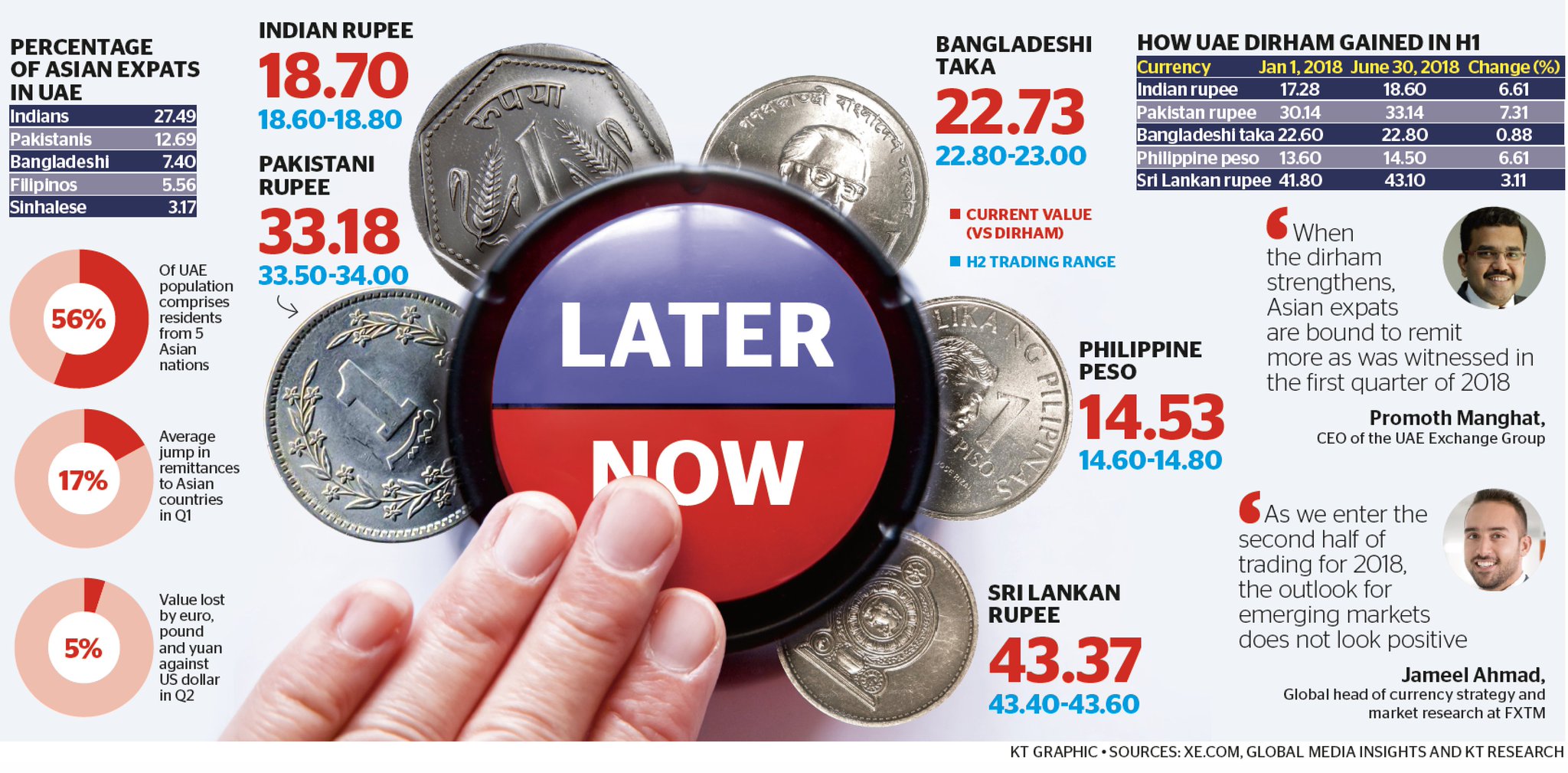Dubai - Expats in the UAE who remit on a monthly basis should continue with their routine as exchange rates are favourable.
Published: Tue 10 Jul 2018, 7:14 AM
Updated: Tue 10 Jul 2018, 10:54 PM
Rising interest rates in the US, political and economic volatility in Asian countries and high oil prices will continue to result in a strong US dollar. This will also make the UAE dirham stronger against Asian currencies because it is pegged to the greenback.
As witnessed during the first half of this year, all Asian currencies - such as those of India, Pakistan, Bangladesh, Sri Lanka and Philippines - lost their value against the UAE dirham. This trend will continue in the second half of the year. Asian currencies will remain under pressure, therefore a large number of Asian expats in the UAE will get more from remitting dirhams.
"We believe that the dollar will continue to strengthen in the second half of the year as the US Federal Reserve is set to hike interest rates again by the year end. Other dominating currencies like the Japanese yen and the British pound, which are paired with the dollar, are also expected to gain momentum in the coming months. The pound may also witness some volatility due to Brexit negotiations. These factors will eventually be beneficial in the strengthening of the dirham in H2 since the UAE currency is pegged at a fixed rate against the US dollar but it will be a drawback for Asian currencies as their value will depreciate further," said Promoth Manghat, chief executive officer of the UAE Exchange Group.
According to Manghat, when the dirham strengthens, Asian expats are bound to remit more as was witnessed in the first quarter of 2018. This caused the remittance volume from the UAE to increase by 17 per cent as compared to the first half of 2017.
"We foresee the trend continuing in the latter half of the year," Manghat added.
According to Global Media Insights, Indians, Pakistanis, Bangladeshis, Filipinos and Sinhalese make up more than half of the UAE's expat population at around 56 per cent.

Rising global crude oil prices play a major role in strengthening the Emirati currency (because the dirham is pegged to the greenback and oil exports are traded in the US dollar) which impacts all Asian currencies inversely.
Related coverage:
UAE expats cheer as dirham gets stronger against Asian currencies
Why remitting from UAE will offer more bang for your buck
Hold on to your cash: Indian rupee may weaken further
Pakistan rupee looking for stable position
Philippine peso weakens on poor forex reserves
Sri Lankan rupee free fall may continue
Here's why Bangladesh taka is well insulated
Besides global factors, there are issues within the respective Asian countries that negatively impact their economies such as the devaluation of the Pakistan rupee by the State Bank of Pakistan, growing trade deficit in the Philippines and India and the rate of inflation and the balance of payments situation in Sri Lanka, Manghat added.
Adeeb Ahamed, managing director, LuLu Financial Group, said Asian currencies have been on a downward slide for the past few months due to Fed rate hikes, trade conflict and weakening of major currencies against the US dollar.
"Some Asian countries have also witnessed political unrest and other disturbances. Apart from this, experts feel there will be a correction to the tune of 10 to 15 per cent in major global stock markets. Taking all this into consideration, we expect Asian currencies to weaken further to the tune of 1 per cent to 1.5 per cent until the third quarter of 2018," Ahamed said.
Sudesh Giriyan, COO of Xpress Money, believes the UAE dirham is most likely to strengthen in the coming months due to the surge in global crude prices, which negatively impacted Asian currencies.
The devaluation of the Pakistani rupee, the balance of payments and inflation in Sri Lanka and the growing trade deficit in Philippines are some of the other factors contributing to the weakening of those currencies. The Indian rupee has been on a decline since April 2018 due to factors such as the widening trade deficit and higher capital outflows apart from rising crude oil prices.
Rajiv Raipancholia, CEO of Orient Exchange, attributed the strengthening of the dirham to the US dollar's movement against Asian currencies. The UAE dirham's movement against these currencies is an automatic result of the US dollar's strengthening position this year.
Hold on to your cash
Manghat advised that expats who remit on a monthly basis should continue with their routine as exchange rates are favourable while investors and other remitters who send larger amounts should wait for a few months if they want to gain more from their depreciated home currency.
The UAE Exchange witnessed an average spike of 17 per cent in remittance volume in the first quarter of 2018 and this trend is expected to continue, with a marginal increase in the second half of this year.
Ahamed suggested that expats make use of this considerable decline and plan their investment or savings accordingly. However, such currency fluctuations do not affect regular remitters and they will continue sending money for family maintenance.
Giriyan said when currencies depreciate, expats tend to remit more due to good exchange rates as they get a better value for their money.
"If the UAE dirham, as expected, becomes stronger in the coming months, the white-collar segment can greatly benefit as they have the advantage of remitting money at their favourable time; they can watch out for good exchange rates and accordingly remit money. The blue-collar segment, on the other hand, remit money irrespective of exchange rates," he added.
- waheedabbas@khaleejtimes.com






